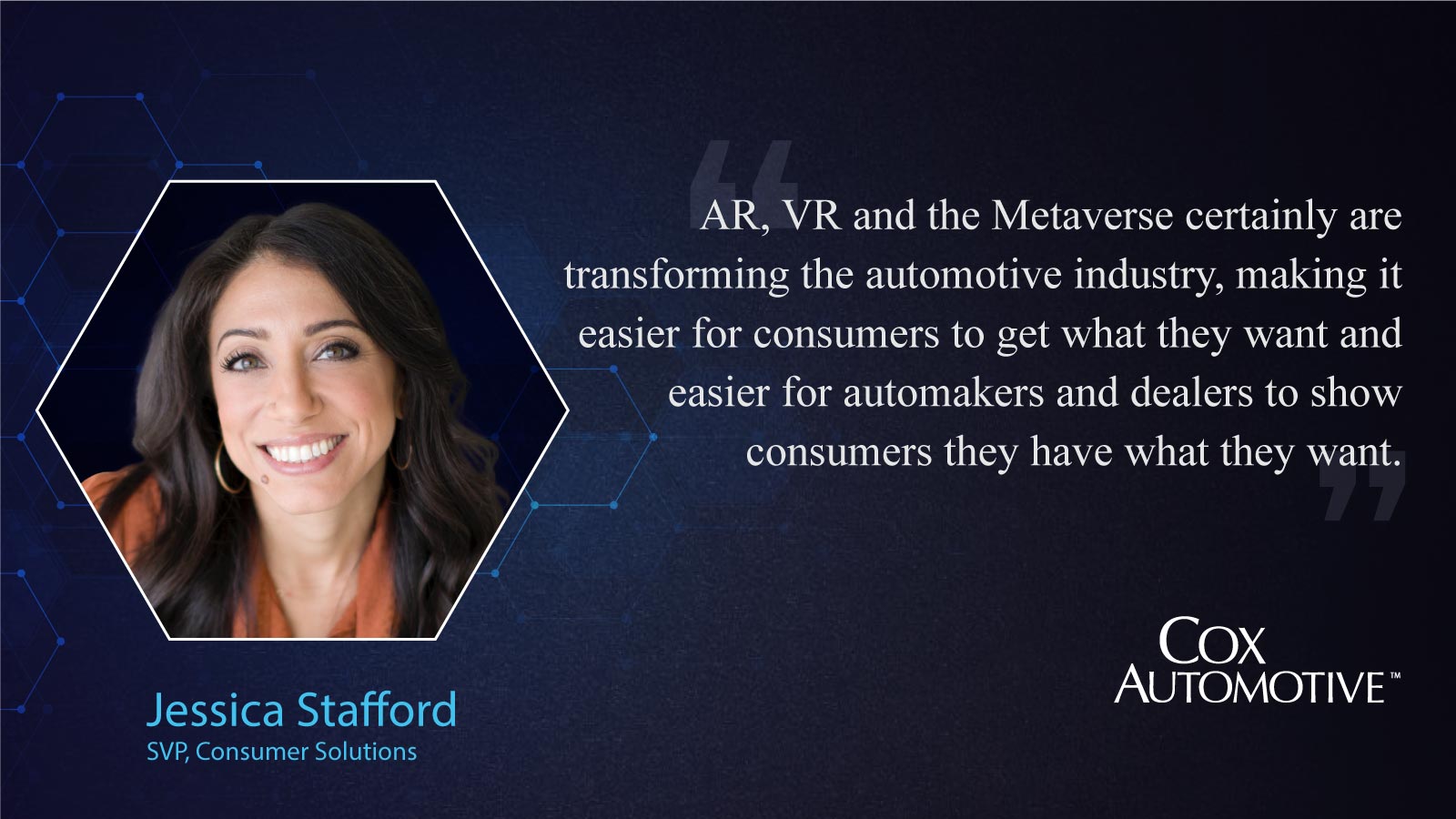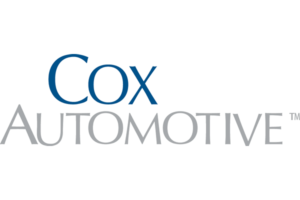AiThority Interview with Jessica Stafford, SVP of Consumer Solutions at Cox Automotive

Hi Jessica, please tell us about your role and the technologies you handle at Cox Automotive.
I’m the senior vice president of consumer solutions at Cox Automotive, overseeing brands such as Kelley Blue Book, Autotrader and Dealer.com. In this role, I focus on how we can connect car buyers, sellers and owners with dealerships in a seamless way.
What were the major milestones for CAI in 2022? How is the new year roadmap set up for consumer experience?
In a year marked by the challenges of a constricting economy, chip shortages, supply chain constraints and tight vehicle inventory, the automotive retail industry’s digital transformation continued in 2022. Due to the ongoing effects of the pandemic, we saw dealerships and consumers alike further gravitate towards eCommerce. And while eCommerce isn’t a new concept for consumers, it is newer in automotive retail, so the transition—and really, it’s an evolution—from kicking the tires to clicking the tires has been an exciting journey.
Cox Automotive’s fully automated eCommerce solution, Esntial Commerce, was introduced in 2022, enabling dealerships to provide their customers with a fully online, AI-driven consumer buying experience, from start to finish. Building from that, now in 2023, we remain laser-focused on delivering solutions that will make retail transactions faster, more personalized, more accurate and more consistent for everyone involved in vehicle selling and buying. Cox’s Retail360 underscores that commitment and provides a complete, personalized view of the car buyer’s journey and one deal workflow. And it’s all powered by Cox Automotive’s first-party data insights and solutions, which are reflective ofmore than 2.3 billion online interactions a year.
Recommended: AiThority Interview with João Graça, Co-founder and CTO at Unbabel
How did the dealer experience change during the pandemic? Which marketing strategies played an important role in bringing car buying experience to pre-pandemic levels?
Pre-pandemic, the movement towards digital retailing was slower, but then the pandemic became the catalyst to make the shift to online car buying more of an imperative, and to do so quickly. It affected all aspects of car buying, where functions such as financing and registration and titling went digital, too.
The pandemic required dealers to better connect online to instore, enabling them to provide consumers with an immersive, digital and seamless experience. Now, as the pandemic has eased, these conveniences are still in demand and are poised to become the new normal. The 2022 Cox Automotive Car Buyer Journey Study revealed 81% of shoppers last year noted that online activities improve the overall buying experience, helping put the enthusiasm back into car shopping. The study also found that 68% of consumers will do most if not all their car buying online in the future, up from 54% in 2021.
Recommended: AiThority Interview with Anthony Katsur, Chief Executive Officer at IAB Tech Lab
How is digital car buying experience changing with involvement of new-gen technologies?
Innovative technologies enable dealers to offer a complete digital car buying experience. The Car Buyer Journey Study showed that consumers’ preference for online car buying continues to increase, whereas only 8% of consumers would purchase a car fully in person moving forward. Digital car buying tools help dealerships build trust through transparency, stay competitive and meet their customers wherever they choose to transact.
Autotrader’s MyWallet is another example of how innovative tech has changed the car buying experience. Funding and finances are important considerations in the car buying process. Thestudy revealed that an increasing number of consumers are relying more on websites for financing research and nearly half of these buyers are interested in using lender websites as a vehicle shopping source. MyWallet is a tool that enables consumers to bring information, such as their down payment and preferred monthly payments with them, as they shop online from car to car and dealer to dealer to secure that penny-perfect deal that’s right for them. Consumers can use MyWallet for all aspectsof a deal, from trade in to financing.
We see that the dealers with the most success are those who are forward-thinking and integrate innovative technologies to help their own operations while streamlining the buying process for consumers.
AR VR and Metaverse are transforming buying cycles. Your take on these trends?
AR, VR and the Metaverse certainly are transforming the automotive industry, making it easier for consumers to get what they want and easier for automakers and dealers to show consumers they have what they want. For example, Cox’s DRiVEQ uses its AI engine to provide real-time insights for automotive decision makers to meet their desired outcomes. AI and VR are also entering the test drive, too, enabling shoppers to virtually test drive a car.
Recommended: Predictions Series 2022: AiThority Interview with Lloyd Adams, President, SAP North America
Tell us more about your recent report and what are the major findings from the industry?
Cox’s annual Car Buyer Journey Study started in 2009; it provides a comprehensive look at the overall vehicle buying process for U.S. consumers. The 2022 study surveyed dealers and more than 10,000 consumers that were in the market for a vehicle.
The key takeaways from the Studywere:
- Overall satisfaction with the car buying journey declined in 2022, with 61% highly satisfied, down from 66% the year earlier.
- Vehicle ordering increased significantly—nearly 1 in 5 new vehicles last year was pre-ordered—and buyers who pre-ordered were generally more satisfied with the overall experience.
- More buyers selected F&I products with their purchases and leaned into lenders they trust. 67% of buyers purchased an F&I product, up from 59% in 2021.
- EV buyers see digital retailing and eCommerce as a way to save time while buyers choosing traditional powertrains feel it is the avenue to achieve the best deal and reduce buying pressure. 87% of EV buyers are open to the idea of buying fully online!
- Nearly all auto dealers—87%—indicate that digital retailing solutions have positively impacted at least one area of their business.
Thank you, Jessica! That was fun and we hope to see you back on AiThority.com soon.
[To share your insights with us, please write to sghosh@martechseries.com]
As Senior Vice President of Consumer Solutions for Cox Automotive, Jessica Stafford leads the two largest automotive shopping brands – Autotrader and Kelley Blue Book – as well as the largest dealer website and marketing business in Dealer.com and Esntial Commerce, Cox’s industry-leading dealer marketing and e-commerce brands. Jessica is focused on driving strategy, innovation and execution to make the car shopping and buying experience easy and exciting by connecting buyers with sellers in a seamless way, and driving profitable, digital transactions.
Cox Automotive is the world’s largest automotive services and technology provider. Fueled by the largest breadth of first-party data fed by 2.3 billion online interactions a year, Cox Automotive tailors leading solutions for car shoppers, automakers, dealers, retailers, lenders and fleet owners. The company has 25,000+ employees on five continents and a family of trusted brands that includes Autotrader®, Dealertrack®, Kelley Blue Book®, Manheim®, NextGear Capital™ and vAuto®. Cox Automotive is a subsidiary of Cox Enterprises Inc., a privately-owned, Atlanta-based company with $21 billion in revenue.


Comments are closed.